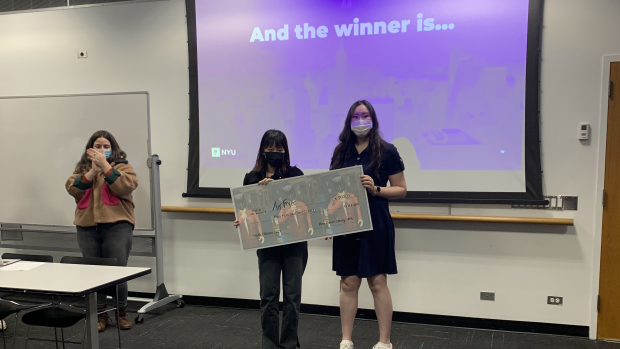Hacking the library experience

Winner of the annual Hack Dibner competition was Team Air Fryer, comprised of Integrated Design & Media majors Danni Qu and Yezi Xu
NYU’s libraries provide the university’s students with invaluable resources they need to succeed but like all large, complex facilities, they aren’t always as user-friendly as they might be.
The annual “Hack Dibner” competition challenges NYU Tandon students to use technology to mitigate the most common challenges — from finding an unoccupied study room to efficiently using the book-borrowing system.
With the help of a group of dedicated mentors, student teams undertook a series of workshops on such topics as project management and proposal presentation and came up with solutions to what they saw as the most pressing problems facing patrons of Dibner, Bobst, and other libraries.
Their work was assessed on the basis of their impact (20 points), feasibility (20 points), contextual inquiry and user experience (20 points), creativity (20 points), written proposal (10 points), and final pitch (10 points). Teams who attended the workshops and consulted library mentors could also be awarded five bonus points for engagement and grit, and when the judges had completed their difficult task, a few clear winners emerged.
Winner of the $500 first prize was Team Air Fryer, comprised of Integrated Design & Media majors Danni Qu and Yezi Xu, who pointed out the inefficiency of the current reservation system and asked: “Why should we have to spend time looking for something we want (study rooms) and settling for our second choice (open space stations) when we don’t have to?”
They explain that because the current system does not show, in real time, whether a room is actually in use or empty, miscommunication easily occurs: a room might sit empty because a student has failed to show up without canceling their reservation, while on the other hand, a student could seize upon an empty room only to be interrupted when the reservation holder arrives slightly late.
Their solution: a kiosk system that streamlines the process and ensures that the maximum number of students can use the highly sought after rooms, especially during high traffic hours.
“Hundreds of students per day will be able to have an optimized, happier studying experience at Dibner,” they predict, once the Air Fryer system becomes a reality.
Second place-winning Team BiblioTech (Business and Technology Management student Melody Yap and Computer Science major Rohan Bhalla) set out to update the room-reservation system in order to improve the end-user experience, especially for new users like themselves. (They are both transfer students who started their NYU journey during the pandemic.) In addition to improving the time filtration function (which now encompasses even hours in which Dibner is closed, wasting valuable screen space) and adding notifications to encourage punctuality, they envision incorporating a group study feature, to promote sociability. “In the post lockdown world, some of us have become estranged from each other and face difficulty in connecting,” they say. “We believe that a group study feature will help introverts and extroverts alike to make friends and find study partners.”
Team Wanderer (Deyin Zhang and Mia Jiayin Fan) earned almost as many points as their second-place counterparts, so judges decided on an additional surprise award. (Like Team BiblioTech, they received $250 for their entry.) Zhang and Fan asked attendees to think back to every time they had tried to find a physical book in the library. Given the number of volumes on the shelves and the scope of NYU’s collections, it might have been a time-consuming and frustrating proposition, akin to using an old-fashioned paper map to navigate a road. The introduction of GPS and services like Google Maps have made that process much easier, they reasoned: what if the library experience could be made more convenient the same way?
Imagine, they said, that the next time you want to find a book, after searching for the title, you could simply follow your phone to the designated shelf, just as you would with an electronic map. After finding the shelf, you would scan it using the phone, and the location of the desired book would appear on the screen. Thanks to mixed-reality technologies, we may all soon be exploring Dibner in the metaverse, they assert.
While they did not go home with cash prizes, other participating teams thought of interesting and innovative ideas to help make the library a more welcoming and useful place for all.
- BookFellas (Riccardo Negri, Sakshi Garg, Hrituja Khatavkar, Stuti Biyani) proposed a way to leverage data in order to sort books by difficulty, relevance, and popularity, among other metrics — a boon to those wanting to delve into a topic outside their area of expertise. (That idea made BookFellas the designated “Audience Choice,” earning them a prize package of swag.)
- Q Lib (Swaroop Manchala, Utkarsha Chourasia) thought of a way to make it possible for a student to simply scan a library book and have a deep-learning model return interactive reviews, comments, explanations, videos, and notes.
- NapDibner (Edward Han, Aneesh Maganti, Calvin Tian) acknowledges that challenging engineering courses sometimes require a power nap beforehand, an impossibility if your dorm is far away. The team believes that students could improve their physical and mental health, better complete their work, and have more fulfilling days if a portion of the library were cordoned off and reserved for that purpose.
Thanks go to this year’s mentors, who conducted the workshops and made themselves available for guidance.
- Lindsay Anderberg, Interdisciplinary Science & Technology Librarian and Poly Archivist
- Matthew Frenkel, Engineering Librarian
- Gaby Garcia, Engineering Reference Associate
- Azure Stewart, CLIR Postdoctoral Scholar
- Samuel Putnam, Director, Bern Dibner Library
The judges who had the difficult job of evaluating the projects included:
- Regine Gilbert, NYU Tandon Industry Assistant Professor
- Harini Kannan, UX Analyst, NYU Libraries
- Liz New, Assistant Manager, NYU Tandon MakerSpace
- Serita Sargent, Lead Student Assistant, NYU Dibner Library




